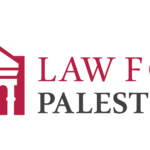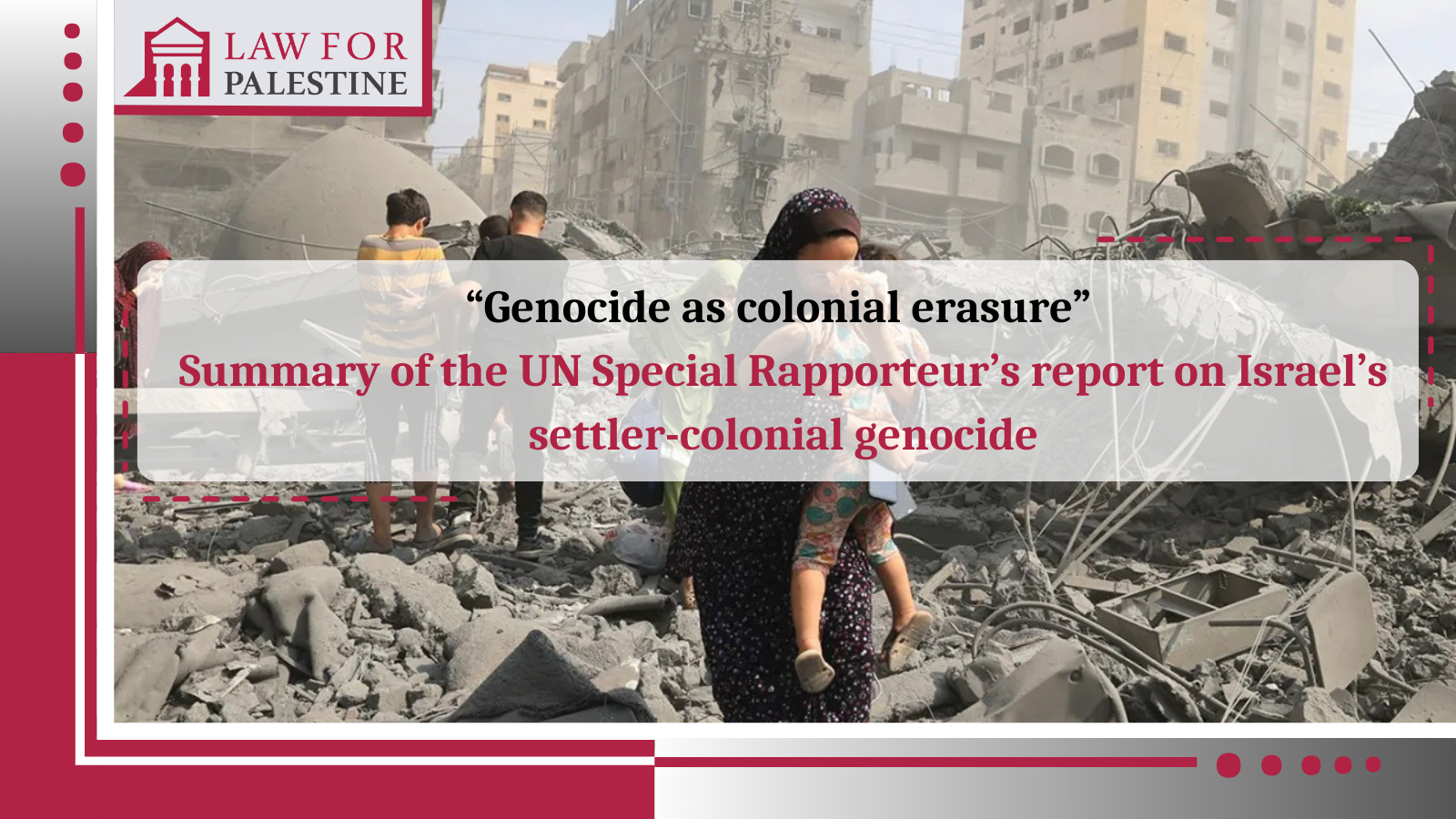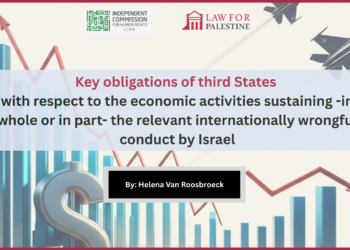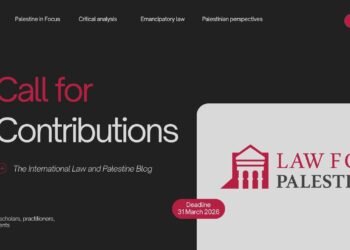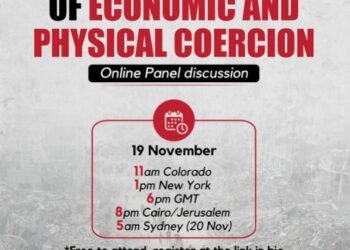Genocide as colonial erasure || Summary of the UN Special Rapporteur’s report on Israel’s settler-colonial genocide
For Law for Palestine
Overview erasure settler colonial genocide Israel
On 30 October 2024, at the 79th Regular Session of the UN General Assembly, Dr. Francesca Albanese, the UN Special Rapporteur on the situation of human rights in the Palestinian Territory occupied since 1967, presented her report entitled “Genocide as colonial erasure,” on the devastating attacks unleashed by Israel against the occupied Palestinian territory (oPt) since 7 October 2023 and their catastrophic consequences. This marks her second report since October 2023, and it outlines the devastating impact of the ongoing genocide in Gaza, alongside the escalation of violence in the West Bank, including East Jerusalem.
In spite of the Special Rapporteur’s mandate and the International Court of Justice (ICJ)’s order that Israel allow international investigators to enter Gaza, Israel has continued to refuse Dr Albanese access to the oPt. The report, based on legal research and analysis, draws on interviews with victims and witnesses as well as remote, open-source information and contributions from experts and civil society (para 2).
The Special Rapporteur reaffirms her legal assessment that Israel’s conduct in Gaza constitutes Genocide. Israel’s unabated genocidal assault on Gaza has led to the forced displacement of at least 90 percent of Palestinians in Gaza and has resulted in vast destruction and unquantifiable losses (para 9, para 13), making Gaza “unfit for human life” (para 15). Following an intensification of violence from Israeli forces and settler militia in the West Bank, including East Jerusalem, the Special Rapporteur concludes that the genocide in Gaza now risks expanding to all Palestinians under Israeli rule (para 83).
The report emphasises that Israel’s genocidal conduct must be understood in a broader context as part of “a century-long project of eliminatory settler-colonialism in Palestine” (para 89) and that “a deliberate campaign of connected incidents” across the entire Palestinian territory should be considered cumulatively (para 62). The Special Rapporteur critically analyses Israel’s disingenuous claims of self-defence and protection of hostages and makes the damning finding that the entire Israeli State apparatus is complicit in the genocidal project. The report concludes that the genocide is a means to an end, namely, “the complete eradication of Palestinians from the land so integral to their very identity” (para 84). She calls for urgent action in response to this grave situation.
The Special Rapporteur’s key recommendations to Member States include: erasure settler colonial genocide
- To enforce the absolute prohibition of genocide, commencing with a full arms embargo and sanctions
- To formally recognise Israel as an apartheid state, to reactivate the UN Special Committee Against Apartheid and to put Israel on notice of possible suspension of its membership (as per Article 6 of the UN Charter)
- To support investigations of international crimes, including on the basis of universal jurisdiction and to investigate and prosecute dual citizens involved in crimes in the occupied Palestinian territory
The analysis and findings of the Special Rapporteur’s report are summarised in greater detail below.
The unfolding genocide as a “means to an end”
In this section of the report, the Special Rapporteur examines patterns of conduct which “evidence an intent to employ genocidal acts as a means to ethnically cleanse all or parts of the occupied Palestinian territory” (para 12). Genocidal conduct in Gaza has proliferated and Israel’s deliberate strategy “to render Palestinian life unsustainable” has intensified across the occupied Palestinian territory.
Failure to cease and punish genocide in Gaza
The Special Rapporteur traces a systematic failure to cease and punish genocide in Gaza, documenting a disturbing proliferation of genocidal acts which have led to “unquantifiable” human, material and environmental losses (para 13). According to reports, nearly 42,000 Palestinians have been killed, of which at least 13,000 were children (para 14), and approximately 96,000 Palestinians have been injured. This magnitude of human loss has been accompanied by vast destruction creating nearly 40 million tons of debris and more than 340,000 tons of waste which have contaminated the ecosystem and contributed to the rapid spread of disease (para 15).
Dr Albanese documents how Israel has continued to attack designated “safe zones”, targeting displaced Palestinians in shelters and displacing them to uninhabitable wastelands (para 16). Evacuation orders have forced the majority of Gaza’s population into a humanitarian zone covering 12.6% of the Gaza strip (para 17), preparing the territory for annexation. Indeed, mass forced displacement has been followed by an expansion of Israeli roads and military bases which suggest “the aim of a permanent presence” (para 17).
Israel continues to target healthcare facilities, water and sewage systems, while obstructing humanitarian aid, as documented in this report. Using arguments of “medical shielding”, Israel has repeatedly attacked healthcare facilities and hospitals (para 18). In the face of a looming outbreak of poliovirus, detected by the WHO for the first time in over 25 years, Israel delayed vaccinations, attacked vaccination areas as well as a UN vaccination convoy (para 19). Systematic attacks on Gaza’s food sovereignty – through the destruction of agricultural land and reservoirs to the targeting of distribution centres – demonstrate an intent to destroy the population through starvation (para 20). 95% of Palestinians in Gaza are currently facing “high levels of acute food insecurity” and the destruction of 93% of agricultural, forestry and fishing economies foretells decades of deprivation to come (para 20).
Moreover, the Special Rapporteur documents a pattern of systematic abuse in a network of Israeli torture camps where Palestinians are subjected to unconscionable treatment, including starvation, severe beatings, electrocution, deprivation of medical care and sexual assault by both humans and animals (para 22).
Risk of genocide in the West Bank, including East Jerusalem
Further, the Special Rapporteur examines critical developments across the occupied Palestinian territory and finds a risk of genocide in the West Bank, including East Jerusalem. She reports that the devastation inflicted on Gaza is spreading to the West Bank, including East Jerusalem, where violent attacks by settler militias have surged alongside harsh detention practices and attacks on medical workers and infrastructure (paras 24-37). Violent settlers, with support of Israeli forces, have killed more than 692 Palestinians and injured 5,199 (para 25). Israeli forces have conducted a mass arrest campaign, leading to the detention of tens of thousands of Palestinians in the West Bank including academic, journalists and human rights defenders (para 27). Like in Gaza, detention practices have been brutal and detainees have been subjected to torture, rape and denial of medical care (para 27).
Israeli forces have conducted sieges, raids and aerial bombardments in camps in the northern West Bank, displacing thousands of families and destroying critical infrastructure (para 29). As part of operation ‘Summer Camps’, launched on 27 August 2024, Israeli forces targeted Jenin, Nablus, Qalqilya, Tubas and Tulkarem, placing the populations under curfew, restricting food and water, targeting public health infrastructure and destroying streets and property (para 30). Targeted attacks on the health sector in the West Bank have been widespread, mirroring the destruction inflicted in Gaza (para 31).
This violence has been accompanied by a furtherance of Israel’s de jure annexation. On 29 May 2024, governance of the West Bank was transferred to civilian authorities, who promptly approved further land appropriation (para 32). Alongside this, Israel has demolished, confiscated or ordered the demolition of over 1,416 Palestinian structures, displacing Palestinian communities and opening up territory in Area C for further colonisation (para 32).
Following her assessment of these escalations, the Special Rapporteur concludes, worryingly, that there is a risk the genocide in Gaza will expand to all Palestinians under Israeli rule.
“The deliberate strategy of Israel to render Palestinian life unsustainable has markedly intensified everywhere in the occupied Palestinian territory, with devastating consequences for Palestinian survival” (para 34).
Understanding the legal complexity and scope of genocidal intent
The Special Rapporteur finds that relevant jurisprudence allows for a “comprehensive interpretative approach” to capture genocidal intent in State conduct (para 38). She begins her examination on the legal complexity of genocidal intent by highlighting three important factors to bear in mind.
First, Dr Albanese highlights that “the compartmentalisation of the conduct into its disparate acts can obscure the requisite genocidal intent” (para 36(a)). As a result of the “magnitude and complexity” of the crime of genocide, genocidal conduct needs to be understood and analysed within its broader context (para 39). This means considering “the destruction caused by the nature and scale of atrocities”, the “fog of war”, “claims to retribution or alternative motives” and “the opportunity to commit genocide” (para 39).
Genocide is often found in combination with other crimes, however it is the pattern of conduct from these crimes considered together that is essential for genocidal intent (para 41).
Second, the report outlines how other acts, aside from the five constituting genocidal conduct, can be indicative of genocidal intent (para 36(b)). In the jurisprudence, the assessment of genocidal intent has been broadly focused on acts which target the foundation of a group, looking at intent to destroy holistically and in totality (para 44). Moreover, it has been recognised that a group is comprised not only of individuals “but also of history and traditions”, as well as the “relationship with the land” (para 45) – a particularly relevant relationship in settler-colonial contexts, where land is “intrinsic to both a people’s right to self-determination and the settler-colonial project” (para 46). Land is an integral part of the identity of an Indigenous population and is therefore “indicative of how the settler-colonial project destroys – in order to replace – the Indigenous Population” (para 46).
In a settler-colonial context, conduct resulting in the disconnection of an Indigenous people from their land – forced displacement, for example – should be considered significant indicators of specific intent targeting the group’s existence (para 48).
The Special Rapporteur argues that, in a settler-colonial context, conduct resulting in the disconnection of an Indigenous people from their land – forced displacement, for example – should be considered significant indicators of specific intent targeting the group’s existence (para 48). Israel’s apartheid regime in the occupied Palestinian territory was recognised by the ICJ in its Advisory Opinion of 19 July 2024, which found that Israel’s continued presence in the oPt was unlawful and that Israel was in violation of Article 3 of CERD, including racial segregation and apartheid (see, for example, Advisory Opinion of 19 July 2024, paras 155 173, 179). The colonial nature of Israel’s occupation was further highlighted in several separate opinions of the ICJ Judges (Separate Opinion of Judge Yusuf para 12, Declaration of Judge Xue para 4, Separate Opinion of Judge Gómez Robledo para 26)
Third, the Special Rapporteur observes that jurisprudence arising primarily from the criminal prosecution of individuals can limit early recognition of State responsibility for genocide (para 36(c)). In Croatia v. Serbia, the ICJ determined that “reasonableness” should be considered when inferring genocidal intent from patterns of conduct, (para 50), namely that genocidal intent is the “only reasonable inference”. Whilst State intent “can be derived from the aggregate of individual perpetrators’ genocidal intents”, an absence of individual criminal convictions should not exonerate a State (para 51). The Special Rapporteur supports the argument made by a group of States currently intervening in The Gambia v. Myanmar that the “reasonableness criterion” requires a “balanced approach” (para 52). This entails filtering out other possible intents not supported by the evidence (para 53(a)), considering State conduct and intent holistically (para 53(b)), and recognising the totality of genocidal conduct such that is not obscured by the “claimed strategies, policies and actions” of the wrongdoing state (para 53(c)). erasure settler colonial genocide Israel
“Totality triple lens”: Israeli intent towards the Palestinians as a group as such
Applying the framework outlined above, the Special Rapporteur looks at Israeli conduct in its totality against all Palestinians in the occupied territory, concluding that intent to destroy the Palestinian people “could not be more evident from Israeli conduct when viewed in its totality” (para 54).
Totality of the land: “Greater Israel”
Dr Albanese notes that successive Israeli Governments have pursued the goal for a “Greater Israel” (Eretz Yisrael), a central tenet of the Zionist project whose realisation has been impeded by the “legally recognised right of self-determination of the Palestinains being tied to that land” (para 55-6). Indeed, whilst Israeli colonies and settler numbers have expanded substantially, Israel has framed Palestinian assertions of self-determination as a security threat serving to “legitimize permanent occupation” (para 57). The Special Rapporteur observes that the events of 7 October “provided the impetus to advance towards the goal of a “Greater Israel”: an opportunistic recolonisation of Gaza and continued annexation and colony construction in the West Bank (para 59). “An opportunity presented itself to sever Palestinian connection to the land, with foreseeable consequences for their Palestinian existence” (para 61).
Totality of the group: destruction of the Palestinian people
The Special Rapporteur identifies a pattern of conduct “deliberately inflicting on the group conditions of life calculated to bring about its physical destruction” (para 63). The occupied Palestinian territory is being “intentionally rendered unliveable”, from the destruction of buildings and infrastructure, to the targeting of children, torture and mass killing (para 62). Systemic destruction of health, food and sanitation infrastructure has resulted in starvation, spread of diseases and forced displacement which “imperils the long-term survival of the group” (para 63). The Special Rapporteur calls the deliberate targeting and destruction of public health “a technique of genocide “by attrition”” (para 63).
In addition, the Special Rapporteur highlights the psychological harm caused by relentless forced displacement, which contributes to “the destruction of the spirit, of the will to live, and of life itself” (para 64). Israeli conduct since 7 October 2023 “has inflicted severe psychological harm on all Palestinians, both direct victims and those witnessing in exile” (para 65). Its overall aim is to “humiliate and degrade Palestinians as a whole” (para 65), causing a pain and loss which “will impact generations to come” (para 65).
Dr Albanese emphasises on the fact that genocidal conduct can target members of the same group in different parts of their territory through acts of varying intensity (para 66). Palestinians within Israel have experienced suppression too and attacks against UNRWA and UN projects have threatened the livelihood of Palestinian refugees across the region (para 66). Patterns of genocidal conduct seen in Gaza are appearing in the West Bank (para 67) and the Special Rapporteur’s analysis is unambiguous: “the only inference to be reasonably drawn from all this is of a clear intention to attack “the group’s capacity to renew itself, and hence to ensure its long-term survival “(para 67).
Totality of the conduct: genocidal intent rationalised as self-defence
Finally, the Special Rapporteur examines how Israel’s arguments of self-defence and counter-terrorism serve to “rationalise” genocidal intent (para 68). Israel’s stated goals of eradicating Hamas and bringing home the hostages do not “preclude a finding of genocidal intent as the only reasonable inference to be drawn” but rather substantiate it (para 68).
Israel’s arguments of self-defence and counter-terrorism serve to “rationalise” genocidal intent (para 68)
The Special Rapporteur quotes Judge Trindade: “perpetrators of genocide will almost always allege that… their actions were taken ‘pursuant to an ongoing military conflict’; yet, “genocide may be a means for achieving military objectives just as readily as military conduct may be a means for instigating a genocidal plan”. (Application of the Convention on the Prevention and Punishment of the Crime of Genocide (Croatia v. Serbia), Judgment, I.C.J. Reports 2015, p.3, Dissenting Opinion of Judge Cancado Trindade, para 144.)
Dr Albanese reiterates that Israel’s use of ‘self-defence’ is erroneous, since “it is well established that Israel cannot legitimately invoke self-defence against the population under its occupation”, whom it has an obligation to protect, not target (para 70). By portraying the entire Palestinian civilian population as “engaged in resistance”, Israel seeks to dehumanise Palestinians and render them “eliminable” (para 70). According to the Special Rapporteur, Israel’s “expansion of full-scale military operations to the West Bank” reveals its “aim to target Palestinians beyond Hamas” (para 71). She finds that Israel’s military conduct has far exceeded the limits of legitimate force, targeting civilian infrastructure and the structures of Palestinian governance (paras 71-72).
Furthermore, the Special Rapporteur notes that Israel’s goal to rescue hostages is undermined by its conduct, including the harm it has caused to hostages through indiscriminate bombing, sabotage of negotiation attempts, and the clear prioritisation of territorial control in Gaza (para 74). erasure settler colonial genocide Israel
Understanding genocidal intent within a State
In this section, the Special Rapporteur turns to the question of State responsibility for genocide. She highlights that State responsibility entails “actions and ommissions that lead to genocide” (para 76). Under international law, a State is obliged to prevent, to not commit and to punish genocide (para 77). According to ICJ jurisprudence, the obligation to prevent manifests “as soon as the State is aware, or should reasonably be aware, of a “serious risk of genocide” (para 77). Actions include the obligation to investigate and prosecute individuals suspected of committing genocide or the ancillary offences (para 77). Failure to act to prevent or punish, with knowledge of the risk of genocide, should be taken as an indication of genocidal intent (para 77).
In a rule of law system, the organs of the state – legislative, executive and judicial – should serve to keep each other in check and should be able to prevent excesses “that may escalate into genocide” (para 78). In making an assessment to determine State genocidal intent, the Special Rapporteur argues that the “failure of a rule of law State apparatus” to carry out these checks, knowing the consequences, “must be seen as an integral part of the totality of conduct” (para 78).
The ICJ’s provisional orders of 26 January 2024 triggered a clear duty for Israel to act. More specifically, the ICJ instructed Israel to refrain from further acts that may amount to genocide, to prevent and punish genocidal incitement, to allow access for humanitarian assistance, to preserve evidence and to submit a report outlining the steps it has taken (para 80). Israel has not complied with these provisional orders.
In addition to statements indicating direct genocidal intent by Israeli officials, the Special Rapporteur documents how the different organs of the Israeli state have contributed to genocidal intent (para 81). She finds that Israel’s parliamentary body, the Knesset, through its passing of emergency legislation and budget approvals, has actively supported government actions (para 81(c)). Similarly, the Attorney-General has failed to prosecute acts “preparatory to and associated with genocide” (para 851(d)) and the Israeli judiciary has failed to provide any limitations, contributing to a persistent culture of impunity whilst whitewashing Israeli violations of international law (para 81(e)). Furthermore, Israeli public and commercial media have aided and abetted the genocide whilst regulatory agencies have failed to take action (para 81(f)). In its settler-colonial context, these state organs do not keep each other in check; instead, they reinforce and perpetuate genocidal conduct.
Israeli public and commercial media have aided and abetted the genocide whilst regulatory agencies have failed to take action (para 81(f))
Conclusions erasure settler colonial genocide Israel
The Special Rapporteur concludes that the genocide in Gaza risks expanding to all Palestinians under Israeli rule (para 83). For decades, Israel has subjected Palestinians to mass killing, apartheid, forced displacement and mass incarceration in advancement of a goal of “Greater Israel” which “threatens to erase the Indigenous Palestinian population” (para 83). She concludes that Israel obscures its genocidal intent through the narrative of ‘self-defence’. (para 84).
Dr Albanese observes that Israel’s genocide of the Palestinians appears to be a means to an end, namely “the complete eradication of Palestinians from the land so integral to their identity, and which is illegally and openly coveted by Israel” (para 84). Responsibility lies not only with individuals with command responsibility, but also with the entire Israeli State apparatus which supports and enables the articulation and execution of genocidal violence (para 86). The Special Rapporteur sees this ongoing genocide as an indisputable “consequence of the exceptional status and protracted impunity that has been afforded to Israel”, despite its systematic violations of international law (para 87). “The devastation of so many lives is an outrage to humanity and all that international law stands for” (para 88).
Recommendations erasure settler colonial genocide Israel
In her recommendations, the Special Rapporteur calls for the cessation, investigation and prosecution of Israel’s settler-colonial project in Palestine. She urges states to adhere to their obligations under the Genocide Convention and the Geneva Conventions, and to consider the tools at their disposal to fulfil these obligations and ameliorate the risk of continuous breach (para 90). Whether acting alone or together, she insists that States should explain to the public and the international community the steps they have taken and the reasons behind them (para 90).
The Special Rapporteur urges Member States to (para 91):
“(a) Use all their political leverage – commencing with a full arms embargo and sanctions – so that Israel stops the assault against the Palestinians, accepts a ceasefire and fully withdraws from the occupied Palestinian territory in line with the ICJ Advisory Opinion of 19 July 2024; erasure settler colonial genocide Israel
(b) Formally recognize Israel as an apartheid State and persistent violator of international law, reactivating the Special Committee Against Apartheid to comprehensively address the situation in Palestine, and warn Israel of possible suspension of its membership under Article 6 of the Charter of the United Nations;
(c) Support the deployment of an international protective presence throughout the occupied Palestinian territory;
(d) Develop a protective framework for Palestinians displaced outside Gaza, in line with international human rights and refugee law, while fully preserving their right to return;
(e) Support independent and thorough investigation(s) of criminal conduct, including genocide and apartheid, including through the application in national courts of universal jurisdiction over those suspected of such criminal conduct, including all relevant ancillary offences;
(f) Investigate and prosecute corporate entities and dual citizens involved in crimes in the occupied Palestinian territory, including soldiers, mercenaries and settlers;
(g) Ensure unhindered humanitarian assistance to Gaza and full financing and protection of UNRWA, including from attacks on its premises and personnel and from libellous smear campaigns, and ensure the continuity of its mandate in all fields.”
She calls on the ICC Prosecutor to examine the commission of genocide and apartheid and to expand its request for arrest warrants (para 92). erasure settler colonial genocide
Finally, the Special Rapporteur recommends that the UN Commission of Inquiry on Israel and Palestine investigates “the broader context of eliminatory intent and practices of Israel against all Palestinians […], including those with Israeli citizenship and the refugees, and recent acts of genocide” (para 93). erasure settler colonial genocide

